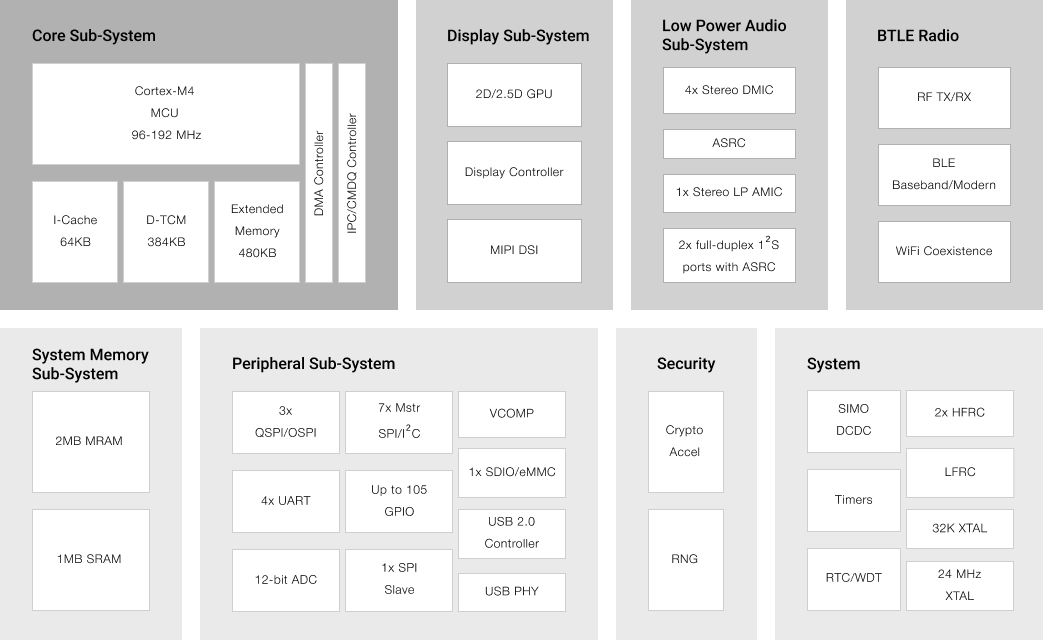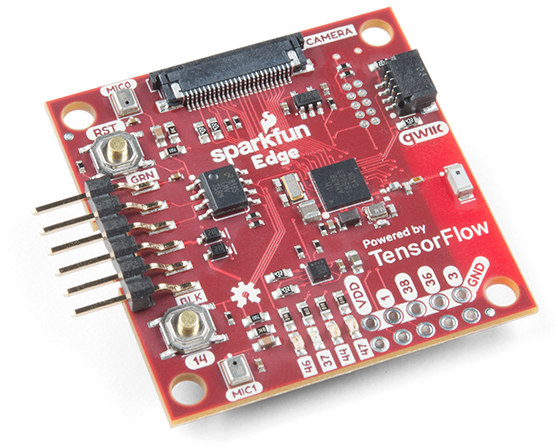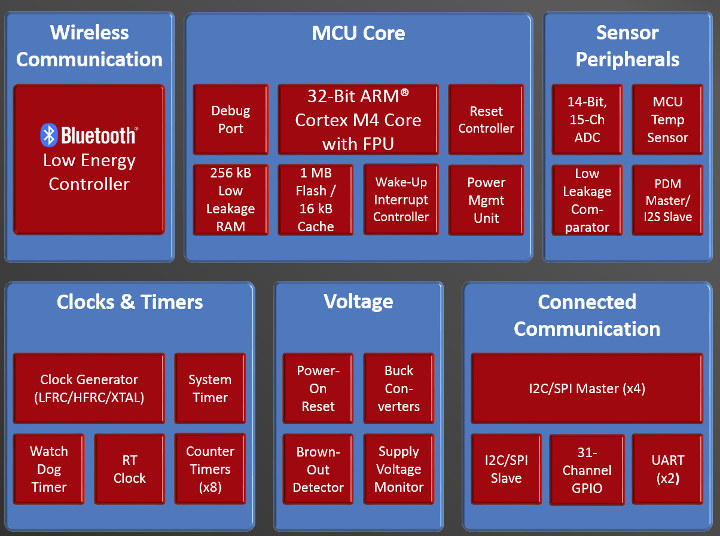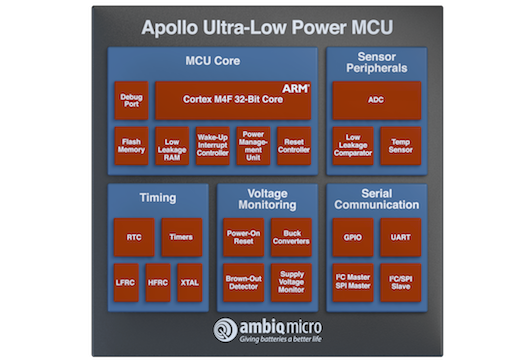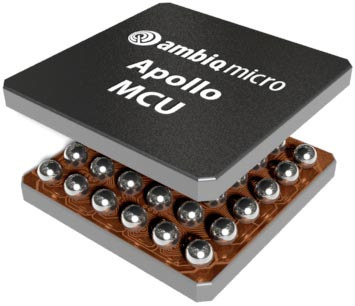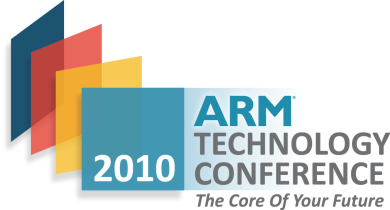Ambiq Micro is using sub-threshold voltages under 0.5V to offer ultra-low-power Arm microcontrollers. In 2015, the company launch the Apollo Cortex-M4F MCU with 30µA/MHz power consumption in active mode, which was followed in 2016 by Apollo 2 in consuming just 10µA/MHz, and Apollo 3 (Blue) dropped power consumption to as low as 6µA/MHz against using a Cortex-M4F @ 48 MHz in active mode. The fourth generation of ultra-low-power Apollo microcontroller has now been announced with Apollo 4 and Apollo 4 Blue microcontrollers – the latter adding Bluetooth – halving the power consumption of Apollo 3 at just 3µA/MHz, or ten times less than the original ultra-low-power MCU from the company. Apollo 4 (Blue) specifications and key features: MCU Core – Arm Cortex-M4F core up to 192 MHz (TurboSPOT) with FPU, Memory Protection Unit (MPU), and Secure Boot GPU – 2D/2.5D graphics accelerator with full alpha blending, texture and frame buffer […]
$15 Sparkfun Edge Board Supports Tensorflow Lite for Microcontrollers
The 2019 TensorFlow Dev Summit is now taking place, and we’ve already covered the launch of Google’s Coral Edge TPU dev board and USB accelerator supporting TensorFlow Lite, but there has been another interesting new development during the event: TensorFlow Lite now also supports microcontrollers (MCU), instead of the more powerful application processors. You can easily get started with Tensorflow Lite for MCU with SparkFun Edge development board powered by Ambiq Micro Apollo3 Blue Bluetooth MCU whose ultra-efficient Arm Cortex-M4F core can run TensorFlow Lite using only 6uA/MHz. SparkFun Edge specifications: MCU – Ambiq Micro Apollo3 Blue 32-bit Arm Cortex-M4F processor at 48MHz / 96MHz (TurboSPOT) with DMA, 1MB flash, 384 KB SRAM, 6uA/MHz power usage, Bluetooth support. Connectivity – Bluetooth LE 5 (on-chip) + Bluetooth antenna Camera – OV7670 camera connector Audio – 2x MEMS microphones with operational amplifier Sensor – STMicro LIS2DH12 3-axis accelerometer Expansion – Qwiic connector, […]
Ambiq Apollo2 Blue Ultra Low Power MCU adds Bluetooth Connectivity
Ambiq Micro unveiled their ultra-low power Apollo MCU back in 2015 with claims of Cortex-M4 performance at Cortex-M0+ energy efficiency by leveraging SPOT (Subthreshold Power Optimized Technology) technology that allows operating the microcontroller at very low voltages (less than 0.5V). Since then the company introduced Apollo2 MCU with 10 μA/MHz power consumption, but still a generic purpose microcontroller. Earlier this year, the company unveiled a new version of Apollo2 microcontroller adding Bluetooth connectivity, and allowing Bluetooth applications that last years on a charge. Meet Apollo2 Blue. Apollo2 Blue key features and specifications: Arm Cortex-M4 Processor up to 48 MHz with FPU, MMU, wake-up interrupt controller with 32 interrupts Ultra-low power memory Up to 1 MB of flash memory for code/data Up to 256 KB of low leakage RAM for code/data 16kB 1 or 2-way Associative Cache Bluetooth 5 Low Energy RF sensitivity – -95 dBm TX: 5mA @0 dBm; RX: […]
Ambiq Micro Introduces Ultra-Low Power Apollo 2 Cortex-M4F MCU Consuming Less than 10 μA/MHz
Last year Ambiq Micro unveiled their Apollo Cortex-M4F MCU with Cortex M0+ energy efficiency thanks to operation in sub-threshold voltage (< 0.5 V), and the MCU is said found in Matrix Powerwatch, a fitness tracker powered by body heat that you never need to charge. The company has recently announced a new version of the micro-controller with Apollo 2 MCU with better maximum performance thanks to a higher maximum clock speed (48 MHz vs 24 MHz), and higher efficiency (10 μA/MHz vs 30 μA/MHz @ 3.3V). Apollo 2 MCU key features and specifications: Ultra-low supply current <10 μA/MHz executing from flash at 3.3 V <10 μA/MHz executing from RAM at 3.3 V ARM Cortex-M4 Processor up to 48 MHz with FPU, MMU, wake-up interrupt controller with 32 interrupts Ultra-low power memory Up to 1 MB of flash memory for code/data Up to 256 KB of low leakage RAM for code/data […]
Ambiq Micro Apollo Low Power MCUs Promise Cortex M4F Performance at Cortex M0+ Energy Efficiency
Ambiq Micro is a US company founded in 2010 that focuses on “extremely low power” semiconductors leveraging their patented Subthreshold Power Optimized Technology (SPOT) platform. Earlier this year, they announced their first low power Cortex-M4F MCU Apollo family with claims of 5 to 10 times lower power consumption compared to other micro-controllers with the same performance. According to an EETimes article, they’ve at least partially backed their claims with a live demonstration at ARM TechCon 2015. Before checking out the test results, let’s have a look at the main features of Apollo MCU family: 32-bit ARM Cortex-M4F processor @ up to 24 MHz, with FPU, and wake-up interrupt controller with 12 interrupts Up to 512KB flash, 64-KB low-leakage RAM “Rich set of timing peripherals” Peripherals I2C/SPI master; I2C/SPI; UART; 10-bit, 13-channel, 1MS/s ADC Temperature sensor with ±2°C accuracy Voltage Range – 1.8 to 3.8V Power Consumption: active mode: 30µA/MHz (executing […]
ARM Techcon 2010 Proceedings and Presentation Slides
A lot have been covered at ARM Techcon 2010. I’ve blogged a few articles about ARM Techcon 2010, but there is a lot more to discover. A full set of documents and presentation slides shown at Techcon 2010 are available at http://vault.eetimes.com/armconference/proceedings/ The documents are divided in 2 main parts: Day 1: Chip Design Conference Day 2-3: System & Software Design Conference which are then divided into sub-directories with really (hmm) good names such as ATC-100, ATC-101… to ATC-165 so that everybody can clearly see what the subjects are. You’ll also have the Keynote and Industry addresses. Since this blog is more related to “System & Software Design” I’ve been through the pain of downloading all documents of this section and checking the subjects. You may do it for “Chip Design Conference” if you wish, I’m sure you’ll enjoy it. You’ll have one or two documents in each folder. If […]


